- Home
- Peter Lerangis
Last Stop Page 2
Last Stop Read online
Page 2
“Your papa!”
“Uh, no,” I replied. “He’s…well, gone.”
Anders’s beard moved, which I took to be a smile. “To ‘the undiscovered country, from whose bourn no traveler returns.’ ”
“You could say that, I guess. Whatever.”
“Are you sure?” Now Anders was glaring.
“Well…yeah. I guess. I mean—”
Ding!
The elevator opened behind me. I glanced at the door. No Heather.
“Talk to Mom about it!” I blurted out as I backed in.
Hallelujah. Escape.
I rode up to the fifth floor and went straight to my apartment. Swinging the door open, I threw my backpack into the living room.
As usual, it landed on the sofa.
As not usual, my mom caught it.
Her hair had been set into curls, and she was wearing makeup. “Where have you been? Don’t tell me. You used dial-a-turtle to get home. You know, we have to be at the studio in fifteen minutes.”
The show. I had totally forgotten about the show. The Sophie Karp talk show.
“Sorry,” I muttered.
Bleeeeeep! went the voicephone.
“Go transform yourself into a prince.” Mom snatched up the receiver. “Hello?…Yes, this is she…Where? No, he doesn’t…Well, okay, thank you very much.”
Mom groaned as she hung up.
“Who was that?” I asked.
“Woman. Old. From a place called Talmadge Swamp. Saw Dad’s photo in a tabloid and swears she spotted him alligator hunting. Now hurry. I am leaving!”
Zoom. Into the bathroom. I showered quickly, wrestled my hair with a comb, and tucked in my shirt.
We sped downtown in an ancient taxi that sounded like pneumonia on wheels. The driver cursed every time he hit a pothole, which was about four times a block.
I didn’t mind. I would have been happy on a camel. Anything besides the subrail.
By the time we reached TFCT, Franklin City’s local TV station, my stomach was fluttery with nerves. Once inside, Mom and I were whisked away to a makeup room, where three or four people fussed over us. It felt kind of cool, until I saw the final result.
My hair was all puffed up and hard as a helmet. The hairspray was making my eyes itch. And I was wearing eyeliner and rouge.
I looked like an idiot.
Next thing I knew, Mom and I were sitting on the living room set of The Sophie Karp Show. And Sophie Karp was smiling at us, talking a mile a minute.
I have no idea what she said. All I remember is that she looked great—killer smile, friendly face, great hair.
The lights blinked on. White. Harsh. Glaring. The theme music began. The studio audience broke into applause.
I was shaking. My stomach felt like the inside of a cement mixer.
“Today we meet a courageous family,” Sophie Karp said as the music died down, “a mother and son on a mission of faith. Six months ago, in the middle of the night…”
Dad. In my nervous state, the images were flooding in. The train grinding to a stop. The lights…
“…and now,” Sophie Karp went on in a hushed, dramatic voice, “when Taylor Moore and her son meet in the kitchen each morning for breakfast, they must remind themselves not to put that third strip of bacon…”
The blood was rushing from my face.
“…not to scramble up that extra egg…”
Keep calm…
“…and I know it’s a lot of stress for a twelve-year-old, isn’t it?”
Now the audience was staring at me.
I turned. Sophie Karp was to my left. Her microphone was in my face.
“Uh, thirteen.” My voice squeaked on the “teen.” Great.
The audience laughed. I felt about two inches tall.
Sophie Karp made some dumb joke, then her face grew serious again. “Every year, thousands disappear, never to be heard of again…”
Mom gripped my hand.
“Are they all dead?” Sophie Karp continued solemnly. “Not so, says our next guest.”
Guest? Who had said anything about a guest?
“Will you please welcome…Gardenia Rouelle-Savant!”
The curtain behind us opened and the audience clapped loudly. In walked a woman about six feet tall, wearing a silk turban and a long, flowing dress. She took a slow bow, her face solemn and dark.
As she walked to us, she seemed to be floating. She sat grandly in a chair to Mom’s right, then leaned over and folded one hand over mine and another over Mom’s, as if we were old friends. She greeted us with a deep, accented “Helllllooo.”
I felt as if lizards were racing up my spine. I did not like this. Not at all.
“Ms. Rouelle-Savant’s book, The World Unseen, has been on best-seller lists for months,” Sophie Karp announced. “She specializes in mysterious disappearances and the life in the hereafter…”
I gave Mom a glance. She looked like someone under attack.
Gardenia Rouelle-Savant’s eyes were closed tightly. “Yesssss,” she moaned. “Ohhhh, yes.”
People would be watching this. My heart was sinking.
“What is it?” Sophie Karp asked. “Do you feel something? Do you know something that will help these people?”
Gardenia Rouelle-Savant let go of Mom and held out her hand toward Sophie Karp, as if to say Be quiet.
“Alan,” she whispered. “Alan Moore? Is that his name?”
Mom nodded warily.
“He’s here,” said the woman.
The audience gasped.
Sophie Karp looked around. “Here in our studio?”
“No,” Gardenia Rouelle-Savant replied gravely. “In a world that coexists with ours. A world that very few of us can see, I’m afraid…only those with the sight.”
A few giggles broke out in the audience.
Gardenia Rouelle-Savant’s eyes slowly opened. They turned toward Mom briefly, then rested on me like dark sunbeams. “And you have it,” she said softly. “Don’t you, young man?”
Phony. She’s a phony.
I knew it, but it didn’t matter. Those eyes were spearing me. I felt light-headed. Freezing cold.
“David?” Mom whispered. “Are you okay?”
He was waiting. He was sane and breathing and happy and waiting for me.
The entire studio seemed to be disappearing in white light, all except the face of Gardenia Rouelle-Savant.
“May I be excused?” I asked.
I didn’t wait for an answer. I stood up and ran toward the men’s room.
Behind me, I could hear the voice of Sophie Karp. “I—I’m sorry. This is a very emotional segment, folks. We’ll have to take a station break. When we come back…” Sniff, sniff. “…men who love women who love their jobs more than men who don’t. Stay tuned.”
She’s trouble.
He’s gone.
4
“YOU LOOK AWFUL ON TV,” Heather said.
“Thanks,” I replied.
Clack-clackety-clack-clack went Heather’s fingers on her computer keyboard.
The words SUBRAIL, FRANKLIN CITY slowly appeared on the screen. Heather clicked on “Search” and sat back.
CONNECTING…a message flashed.
Outside Heather’s window, the sixth-day-morning dog walkers were heading for the park. They looked as bleary-eyed as I felt.
Heather’s parents were asleep in the next room. Her baby brother was asleep, too. I should have been asleep, recovering from the Sophie Karp show the day before. But no. Heather had to call and apologize, then insist I come over.
And I had been stupid enough to accept.
“Uh, why are we doing this?” I asked.
Heather ignored the question. “You should be excited. I mean, if someone told me I could see into parallel worlds—?
“I can barely see our world at this hour.”
“Click on, David. Gardenia Whatever is famous. What if she’s right? Haven’t you read any science fiction?”
“Those are st
ories, Heather. This is real life. That woman is a fake. She doesn’t have a license or a degree or anything.”
“Then how did she know your dad’s first name?”
“She could have looked it up in the directory.”
“And how did she know you saw him in that train station?”
“She didn’t know! All she said was—?
Heather wasn’t listening. A list of sites had popped onto the screen. Heather scrolled down, then clicked on one of the titles: “Abandoned Treasures: Stations of the Past.”
An article appeared instantly. Heather skimmed through it, then stopped.
“Listen to this.” She began to read:
“ ‘Thirty years ago, at the height of the city’s financial trouble, several stations were discontinued rather suddenly’…blah blah blah…‘Passengers who used the Granite Street station were appalled one morning to arrive at their familiar entrance, only to see a freshly cemented sidewalk.’ Aha! That’s it!”
“That’s what?”
“Don’t you get it? Thirty years ago. It’s a rip in time! You were looking back into the past, David!”
Groaning, I launched myself onto Heather’s bed. It hit the wall with a thump. “You called me on a weekend morning, woke me in the middle of a dream, and made me come over here for your stupid science fiction ideas?”
“ ‘Nowadays the stations lie moldering,’ ” Heather read on, “ ‘used on occasion as storage space and movie sets.’ ”
“There you go,” I said. “A movie set. That’s what I saw.”
“Uh, right, David. A movie set visible only to you. The Vanishing Mole People of Granite Street.”
The image replayed itself in my mind for about the millionth time. But something stood out. Something I hadn’t really paid attention to.
I sat up suddenly. “It wasn’t Granite Street.”
“Yes, it was, David—”
“No! The sign on the wall. It didn’t say Granite Street. It was something else. A numbered street.”
Heather looked at me skeptically. “That’s ridiculous. Why would it have said that?”
“You’re asking me? The whole thing is ridiculous—it was a hallucination!”
“Unless, years ago, the station had another name…” Heather began clacking away at the computer again. “Like when the city was first founded…”
“They didn’t have subrails back then!”
BLEEEEEEEEP!
Saved by Heather’s voicephone.
She leaped across the room and picked it up. “Hello?…You what?…Get out of here!…” Heather’s eyes were darting nervously toward me. “Both of you?…What were you doing down there?…Oh my God…Okay. We’ll be right down.”
Heather slammed down the receiver and headed for her door. “Come on. We’re out of here.”
I tagged close behind. “Wait! Where are we going?”
“To the subrail,” Heather replied, grabbing a coat from a hook in the front closet. “It looks like you’re not the only one who has the sight, David. Clarence saw it, too.”
Clarence?
Curious.
5
I PANTED FOR BREATH as we ran down Wiggins Street. “Are you sure they were serious?”
“I will be so-o-o-o-o angry if I’m not able to see this thing,” Heather said through clenched teeth.
“What are they doing down there on a weekend morning, anyway?” I pressed on.
“It figures, doesn’t it? I’m probably the only one of us who doesn’t have the sight—”
“And why did they just happen to call you? And why are they still down there?”
Heather glanced my way, as if she just now noticed me. “Clarence is kind of freaked out, and he won’t stop pacing the platform. He wants to go back and take the ride again, just to be sure. Max remembered what you had seen—”
“How could he remember? I never told him!”
“I did.”
I stopped running. I felt as if I’d been punched in the stomach.
“This was supposed to be a secret, Heather!”
“Sorry,” Heather said, turning toward me.
“I only told Max, though. And I didn’t mention the part about your father—”
“But you promised!”
“Don’t be a baby, David. This is important.”
“And a promise to me isn’t?”
Heather rolled her eyes. “We are talking about a major psychic phenomenon, okay? I guarantee, this cannot stay a secret for long. You will be needing a press agent soon.”
“And I guess you want the job!”
“I will ignore that remark. Instead, like a good friend I will politely answer the question you asked me. For your information, Max called your house first. Your mom found the note you left, and she told them you were with me. Max and Clarence and the others were on the way home from an early strike-ball game downtown. Any other questions?”
“Heather, I don’t want to have anything to do with this!”
“Fine. Good-bye.”
Heather disappeared down the station stairs.
I glowered at her for a moment.
Then, grumbling, I followed.
Max and Clarence were waiting just inside the rotary gates. So were three other kids from our class, all in strikeball uniforms—Cheryl Howard, Rod Skinner, and Lenny Feldman. All of them looked a little shell-shocked.
“Oh, great,” I murmured as I caught up with Heather. “It’s turning into a party. Soon the whole school will know.”
“I said I was sorry,” Heather hissed.
I inserted a token into the rotary gate and pushed my way through. “Listen, you guys, if this is some kind of joke—”
“Did you all see it?” Heather asked.
Max shook his head. “Just Clarence.”
“He wants to go back,” Lenny said. “With witnesses this time. As many as possible.”
Rod Skinner circled his index finger around his ear in a cuckoo gesture. Max immediately poked him in the side.
“Oh. No offense, Moore,” Rod said.
“David, maybe you can get through to him,” Max said. “We can’t. He just shut off.”
“Talk to him,” Heather whispered.
They were all looking at me now. With concern.
I approached Clarence. He didn’t seem to notice me. He was pacing the floor, looking up the track, and muttering, “Come on…come on, baby.”
In the distance, I could hear the oncoming train. “Clarence?” I said.
“Leave me alone!” He snapped around angrily. But his face instantly softened. “Oh, it’s you…”
A joke. He’s playing a joke. “Uh, Clarence, can you tell me exactly what you saw?”
He shrank into himself, looking off into the distance. “This light…I mean, I guess it was light…but how…?”
Cheryl was behind me now. “He said it was bright out there, but the inside of the car was pitch-black.”
How could he have known that detail? Had I told that to Heather?
“Clarence, were there people on the platform?” I pressed.
Clarence nodded. “The door opened. And someone on the train—a kid—he stepped out. And they were so happy to see him.”
I braced myself for the question I had to ask. “Did you see…anyone you recognized?”
WHO-O-O-O-O-ONK! With a loud horn blast, the train pulled into the station.
We all turned to one another.
“Uh, Clarence,” Lenny said, “you sure you don’t want to go home…”
“Get some rest…” Rod continued.
The train was stopping now, its brakes shrieking. “No,” Clarence said. “We have to go.”
Heather gave me a look. A see-I-told-you-so look.
She boarded the train after Clarence. Then Max, Rod, Cheryl, and Lenny.
I tried to move my legs but they wouldn’t go. The thought of taking the trip again was paralyzing me.
Heather stood in the door, holding it open. “Well?�
�
“I—I have to think about this—“I stammered.
Heather yanked me inside by the arm.
The doors whooshed closed. The car was empty except for a man in a down coat sleeping on one of the bench seats. Lenny, Cheryl, Max, and Rod were already kneeling on another seat, staring out the window.
Clarence was by the door, gripping a handrail. His jaw was set, his face grim. Heather stood next to him. “Tell me when you see it,” she whispered.
The train began to roll, picking up speed. It stopped at Deerfield, then went on.
My legs started to shake.
Then the Granite Street station was coming into view. Dim and grimy and empty. But the train was not slowing down.
We were going to pass right by.
EEEEEEEEE…Squealing brakes.
The train lurched violently, then stopped.
I tumbled to the floor.
Then, blackness. No light whatsoever. I could feel Heather next to me, sprawled on the floor.
And Clarence started screaming.
But we were told not to interfere.
It may not work if we don’t.
6
I TRIED TO SCRAMBLE to my feet, but my legs were tangled with Heather’s.
“Get off me!” I shouted.
“You get off me!” Heather cried.
“AAAAAAAGHHHH!” Clarence repeated.
Heather grabbed my shoulders. I grabbed hers. We both struggled to stand up.
My blood pounded. I was scared. Scared of seeing Dad’s face. Scared that I wouldn’t see it. Scared that I wouldn’t know what to do. That the train would pull away before I could decide.
I forced myself to look out the window.
My heart stopped beating. Stopped cold.
A sooty floor. A few lightbulbs. Broken tiles.
Nothing else.
“What the—?” I said.
I don’t know who started laughing first. Max, I think.
Then Cheryl let out a snort. And before long, everyone but Heather was whooping like a hyena. Cracking up. I could see their silhouettes in the darkness, bobbing up and down.
“And the Best Actor Award goes to Clarence Mitchell!” Max hooted.
“You guys are sick,” Heather rasped.

 The Orphan
The Orphan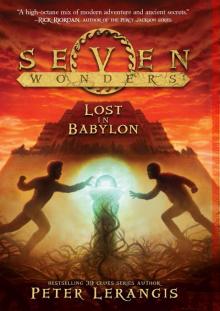 Lost in Babylon
Lost in Babylon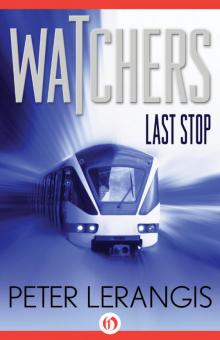 Last Stop
Last Stop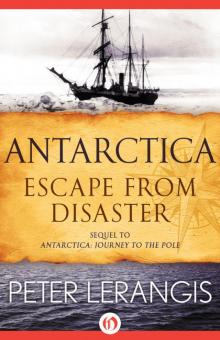 Antarctica Escape from Disaster
Antarctica Escape from Disaster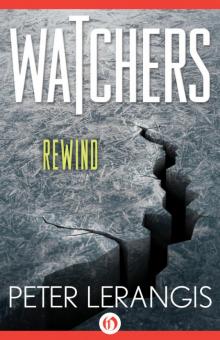 Rewind
Rewind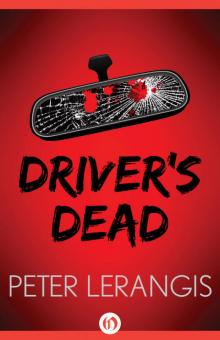 Driver's Dead
Driver's Dead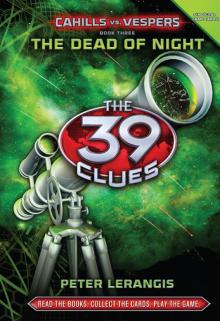 The Dead of Night
The Dead of Night The Promise
The Promise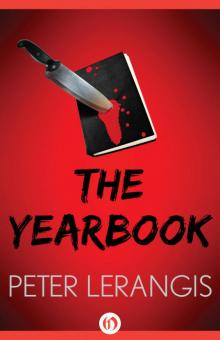 The Yearbook
The Yearbook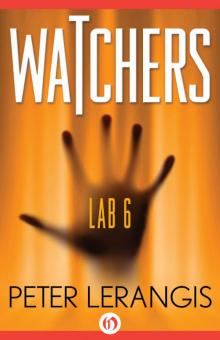 Lab 6
Lab 6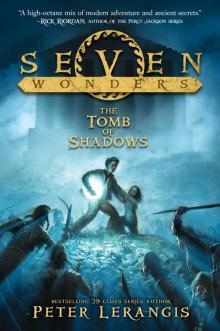 The Tomb of Shadows
The Tomb of Shadows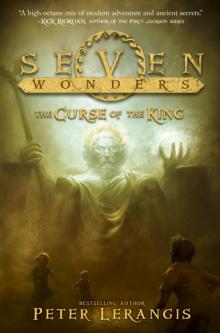 The Curse of the King
The Curse of the King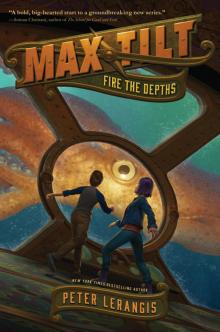 Max Tilt: Fire the Depths
Max Tilt: Fire the Depths The Fall Musical
The Fall Musical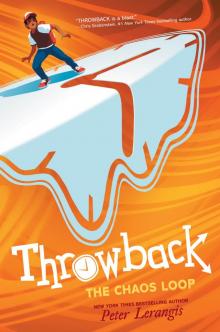 The Chaos Loop
The Chaos Loop Island
Island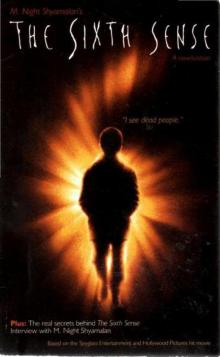 The Sixth Sense
The Sixth Sense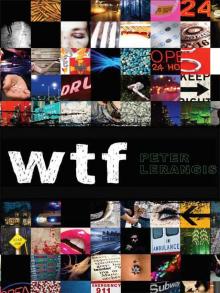 Wtf
Wtf War
War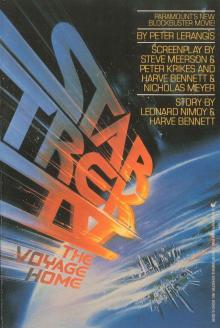 Star Trek IV, the Voyage Home
Star Trek IV, the Voyage Home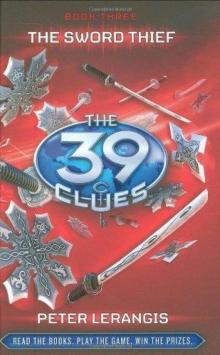 The Sword Thief
The Sword Thief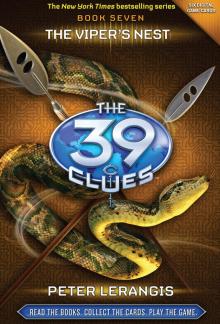 The Viper's Nest
The Viper's Nest The Select
The Select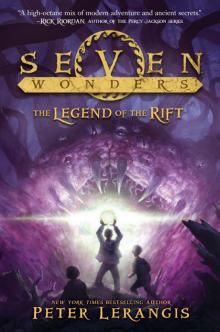 The Legend of the Rift
The Legend of the Rift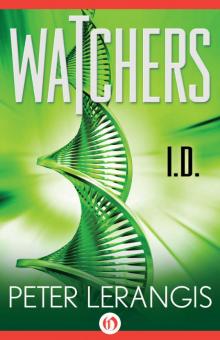 I.D.
I.D. The Sword Thief - 39 Clues 03
The Sword Thief - 39 Clues 03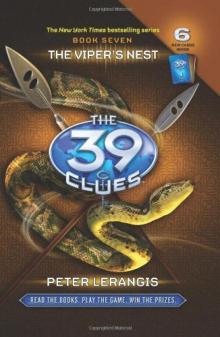 The 39 Clues Book 7: The Viper's Nest
The 39 Clues Book 7: The Viper's Nest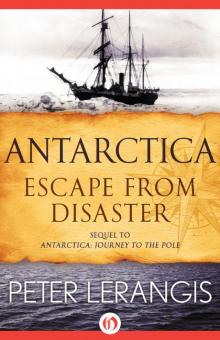 Antarctica
Antarctica Seven Wonders Journals: The Select
Seven Wonders Journals: The Select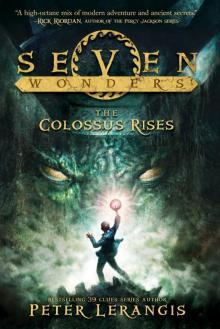 Seven Wonders Book 1: The Colossus Rises
Seven Wonders Book 1: The Colossus Rises Enter the Core
Enter the Core![39 Clues _ Cahills vs. Vespers [03] The Dead of Night Read online](http://i1.bookreadfree.com/i1/04/02/39_clues_cahills_vs_vespers_03_the_dead_of_night_preview.jpg) 39 Clues _ Cahills vs. Vespers [03] The Dead of Night
39 Clues _ Cahills vs. Vespers [03] The Dead of Night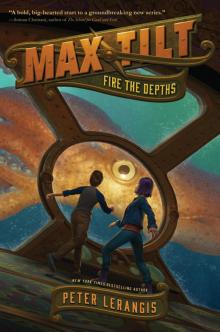 Fire the Depths
Fire the Depths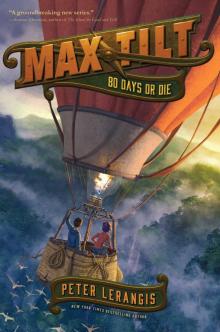 80 Days or Die
80 Days or Die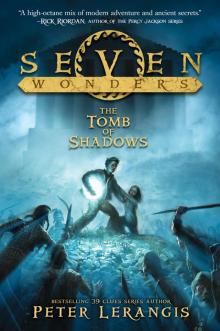 Seven Wonders Book 3
Seven Wonders Book 3